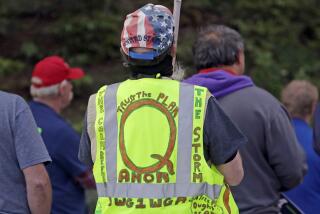Fang Lizhi, the ‘Contaminant’ : Dissident’s Ideas Live in the People--and Inside the Embassy
- Share via
In our first meeting with Chinese physicist Fang Lizhi and his wife, Li Shuxian, we came to understand why they have so enraged Chinese authorities. They refuse to accept not only the dictates of the Chinese Communist Party but its very legitimacy. Like the prophets of the Bible, as well as fellow physicist Andrei Sakharov and his wife, Elena Bonner, Fang and Li hold to a different--and to many, a higher set of values: human rights, decency and democracy. Neither the Fangs nor the Sakharovs have any patience with the excuse that arbitrary state controls are essential because the masses in China and the Soviet Union are not yet ready for self-rule or democracy. The Fangs and the Sakharovs are iconoclasts in societies where secular icons, arbitrarily decreed by the ruling Communist officials, are not to be challenged.
Why was it, we asked the Fangs, that it was the hard scientists and a small number of literary intellectuals, such as Liu Binyan, who like the Fangs and the Sakharovs were among the first to challenge Communist Party orthodoxy? Why not the social scientists who, after all, presumably specialize in such matters? To Fang, the answer was simple. As a physicist, he had access to scientific literature from the outside world. He recognized that the official Chinese depiction of science differed from what fellow scientists in the outside world accepted. It was scientific criteria rather than political accommodation that affected his thinking and values.
In the same way he came to question official Chinese descriptions of political, social and economic conditions both in and outside China. That meant that Fang and Li were among the first to question not only Mao but the entire Chinese Communist Party system. To Chinese officials, this meant that Fang was a troublemaker and a contaminant to be eliminated.
There is no doubt that Fang’s ideas and his actions have had an impact on the democracy movement in China. In many ways, he served as the inspiration for the student demonstrations that occurred in December, 1986. But the irony is that in the recent demonstrations, Fang consciously kept a low profile.
The Chinese authorities, however, must find someone or something to blame, and Fang is a convenient scapegoat. It is so much simpler for the leadership to say that Fang and a few student leaders caused the whole problem. Otherwise, the implication would be that poor political leadership and corruption among officials had provoked the student demonstrations.
By blaming someone prominent like Fang, they also can explain away the chaos and disorders that occurred and the fact that workers and ordinary people as well as students joined in the demonstrations. Since the creation of the Solidarity movement in Poland, there is nothing as frightening for Communist Party authorities as the nightmare that workers may take to the streets to protest not only economic upheaval but political deprivation as well.
Against this background, it may be easier to understand why the Chinese leadership has called for the arrest of Fang and Li, even though of necessity this has created an inevitable fight with the United States. President Bush was embarrassed because he and his staff did not make more of a fuss when the Chinese police kept Fang from attending Bush’s dinner in China a few months ago. Providing temporary refuge for Fang and his wife helps to compensate for that earlier show of timidity.
Yet from the Chinese point of view, the safety provided by the U.S. Embassy in Beijing is infuriating. It brings back memories of the 19th Century and extraterritoriality, when foreign governments set up special enclaves and declared themselves exempt from Chinese sovereignty. Under the circumstances, we cannot assume that the Chinese will respect international law and customs that are supposed to protect the operation of foreign diplomats and embassies. Whether we see a repeat of the sacking of the U.S. Embassy in Tehran, we should remember that during the Boxer Rebellion in 1900, the Chinese put embassies under siege for two months. During the Cultural Revolution, Red Guards torched the British Embassy.
Recent Chinese history has been scarred by periodic shifts between rationality and chaos. Admittedly, during the last few years, the Chinese seemed to be moving closer and closer to what appeared to the outside world to be normalcy. Yet we should not lose sight of the fact that rapid change and rapid economic growth can be disruptive, be it in China, Iran or the Soviet Union. The danger is that the conservatives overreact, as they seem to be doing now.
It is tragic that recent events should be reduced to an assertion by the Chinese government that what happened never happened, and to an attack on the U.S. government for sheltering Fang. But in many ways this shows how difficult change can be for totalitarian regimes and how heroic, prophetic individuals symbolize both bravery and hope.
More to Read
Sign up for Essential California
The most important California stories and recommendations in your inbox every morning.
You may occasionally receive promotional content from the Los Angeles Times.













